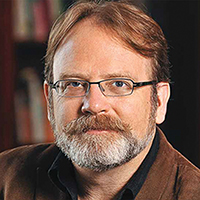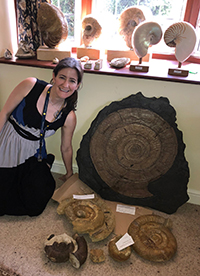 Rosie L. Oakes. Academy of Natural Sciences of Drexel University, Philadelphia, Pennsylvania, USA. roakes@drexel.edu
Rosie L. Oakes. Academy of Natural Sciences of Drexel University, Philadelphia, Pennsylvania, USA. roakes@drexel.edu
Rosie Oakes is a micropaleontologist, biogeochemist, and oceanographer who is interested in how changes in ocean chemistry impact marine biota. She is currently a Postdoctoral Researcher at the Academy of Natural Sciences of Drexel University in Philadelphia where her research is focused on understanding the impact of ocean acidification on calcareous plankton, specifically a group of tiny swimming snails called pteropods.
Beyond the lab, Oakes believes that it’s important to share the results of her research with the world. In addition to travelling to international science conferences and publishing papers, she makes time to attend school science fairs and participate in outreach events in a hope to inspire the next generation of scientists.

 Morgan Hill Chase. American Museum of Natural History, New York, New York, USA. mchase@amnh.org
Morgan Hill Chase. American Museum of Natural History, New York, New York, USA. mchase@amnh.org
Morgan Hill Chase is a manager of the Microscopy and Imaging Facility at the American Museum of Natural History. She applies her knowledge to help researchers across the departments at the museum to image and CT scan a wide range of specimens from meteorites to monkeys. Chase is an Evolutionary Anthropologist by training (B.S. Rutgers) but focuses now on imaging and methodology. She has studied and excavated Paleoanthropological sites in Kenya, and still takes special interest in early human origins.

 Mark E. Siddall. American Museum of Natural History, New York, New York, USA. siddall@amnh.org
Mark E. Siddall. American Museum of Natural History, New York, New York, USA. siddall@amnh.org
Mark Siddall has devoted his career to uncovering biodiversity and evolutionary histories for the most successful animal life-history strategy of all time: parasitism. His research has encompassed protistan parasites from giardiasis and malaria to commercially significant shellfish pathogens, helminths, and even blood-feeding ectoparasites from bed bugs to leeches. Anchored in a deep a tradition of fieldwork that spans the globe, Siddall has been central to the Sackler Institute of Comparative Genomics adopting and leveraging emergent DNA sequencing technologies to advance biodiversity sciences.
Siddall is a defender of the need to conserve neglected organisms such as leeches. He is also an outspoken advocate for pressing eradicable human parasites to extinction while capturing knowledge about their life-cycles, ecology and genomics as they are decidedly extirpated. Exhibitions that he has curated at the Museum include The Power of Poison, Picturing Science, and Undersea Oasis.

 Jocelyn A. Sessa. Academy of Natural Sciences of Drexel University, Philadelphia, Pennsylvania, USA. jsessa@drexel.edu
Jocelyn A. Sessa. Academy of Natural Sciences of Drexel University, Philadelphia, Pennsylvania, USA. jsessa@drexel.edu
Jocelyn Sessa is a paleobiologist who uses the fossil record as a natural laboratory to study times of change in earth’s history. Her research melds fossil and modern data to elucidate the response of mollusk faunas (clams and snails) to environmental perturbations across space and time. Sessa’s studies span a wide range of events, from the mass extinction that killed off the dinosaurs to past climatic fluctuations, including intervals of past and present global warming. By analyzing the chemistry of mollusk shells, she also reconstructs the climatic conditions that affected ecosystems.
Sessa’s hunt for mollusks is a worldwide endeavor, with fieldwork along the US eastern seaboard, the US Gulf Coast, California, Romania and Angola. An important facet of her scholarship is mentoring high school through graduate students in research projects. Sessa is passionate about making science accessible to everyone. Since 2007, she has participated in programs to engage groups under-represented in the sciences, most recently in NYC and Philadelphia.

